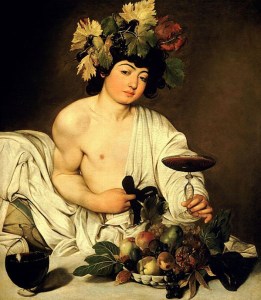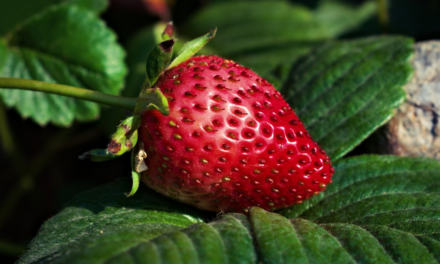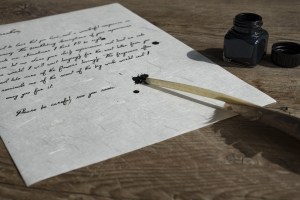We support our Publishers and Content Creators. You can view this story on their website by CLICKING HERE.
Emily Dickinson creates a simple buffet for our imagination in her nature and summer poems, but most especially in “I taste a liquor never brewed.” And rather than being appalled by her celebration of “drunkenness,” I embrace her abandoned delight in the essence of summer.
 I taste a liquor never brewed –
I taste a liquor never brewed –
From Tankards scooped in Pearl –
Not all the Frankfort Berries
Yield such an Alcohol!
Inebriate of air – am I –
And Debauchee of Dew –
Reeling – thro’ endless summer days –
From inns of molten Blue –
When “Landlords” turn the drunken Bee
Out of the Foxglove’s door –
When Butterflies – renounce their “drams” –
I shall but drink the more!
Till Seraphs swing their snowy Hats –
And Saints – to windows run –
To see the little Tippler
Leaning against the – Sun!
As a poet, Emily Dickinson creates a simple buffet for our imagination in her nature and summer poems, but most especially in “I taste a liquor never brewed.” By her very first implication, the reader knows that this poem does not refer to something natural, something “brewed” by man, but to the sense of something hard to define. This mysterious element combined with unusual imagery elicits a playful almost festive theme of the summer season, and dare I say, a brash approach to provoke any conservative reader.
Dickinson persistently uses drunken imagery in all its connotations as a metaphor for the exhilaration she enjoys outdoors in the summer. She first mentions that nothing can compare to this heady sensation, no other emotion can “yield such an alcohol.” The imagery continues as she next mentions she is drunk on the very air and summer dew, “reeling” all season long in the “inns” or taverns under the sky. Dickinson even relishes summer more than the insects that thrive then. Lines 9 through 12 show how the bee has had his fill of “drink” from the foxgloves, and the butterflies now “renounce their drams” and can’t drink or even desire another drop. Yet Dickinson exclaims she’ll keep drinking—consuming, absorbing, enjoying all creation.
Part of the power of this poem is the first person narration in the first three stanzas. In line 1, Dickinson tastes this “liquor” of summer. In line 5, she is the one who is drunk on air and dew, and in line 12, she shouts that when the bee and butterflies are done drinking, “I shall but drink the more!” Her point of view is just that, not a commentary or guide to how the reader should feel about summer, but an exclamation of her intense emotion in a most unusual metaphor. This is her revelry.
However, the perspective of the final stanza shifts as Dickinson describes angels and saints in heaven gazing down through their “snowy Hats” or clouds and “windows” at her. As narrators, they in turn term her a “Tippler,” someone who makes a habit of drinking. Of course, a tippler isn’t an extreme drinker or drunk but simply a regular and daily drinker. The angels and saints witness her “Leaning against the – Sun!” not overcome and leaning against a bar or wall in a tavern, but against the sun itself, the epitome of the season. Who doesn’t want to drink in the sun every day?
So much of Dickinson’s description lies in tangible sensation, the taste of drink, or even physical movement, but not in color or sound. Yet the absence of these two senses does not diminish her apparent expression of heart-felt emotion. Rather than being appalled by her celebration of “drunkenness,” I embrace her abandoned delight in the essence of summer. Before the summer flees entirely, I once more remember her words in “Indian Summer”:
These are the days when Birds come back,
A very few, a Bird or two,
To take a backward look.
These are the days when skies put on
The old, old sophistries of June
A blue and gold mistake.
Oh, fraud that cannot cheat the Bee,
Almost thy plausibility
Induces my belief,
Till ranks of seeds their witness bear,
And softly thro’ the altered air
Hurries a timid leaf!
Oh, Sacrament of summer days
Oh, Last Communion in the Haze,
Permit a child to join,
Thy sacred emblems to partake
They consecrated bread to take,
And thine immortal wine!
This essay was first published here in August 2019.
The Imaginative Conservative applies the principle of appreciation to the discussion of culture and politics as we approach dialogue with magnanimity rather than with mere civility. Will you help us remain a refreshing oasis in the increasingly contentious arena of modern discourse? Please consider donating now.
The featured image is “Bacchus” (c. 1598) by Caravaggio, and is in the public domain, courtesy of Wikimedia Commons.
Share This Story, Choose Your Platform!
Go to Top

 Conservative
Conservative  Search
Search Trending
Trending Current News
Current News 






